- Home
- Sue Grafton
C Is for Corpse Page 9
C Is for Corpse Read online
Page 9
When I got back in my car, I checked my teeth in the rearview mirror to make sure they weren't flecked with alfalfa sprouts. I prefer not to interview people looking like I've just been grazing out in some field. I leafed through my notebook for Rick Bergen's parents' address and then I hauled out a city map. I had no idea where Turquesa Road was. I finally spotted it, a street about the size of an ingrown hair, off an equally obscure lane in the foothills that stretch across the back of town.
The house was staunch and plain, all upright lines, with a driveway so steep that I avoided it altogether and squeezed my car in along the ice plant growing below. A bald cinderblock wall prevented the hillside from tumbling into the road and gave the impression of a series of barricades as it zigzagged up to the front. Once I reached the porch, the view was spectacular, a wide-angle shot of Santa Teresa from end to end with the ocean beyond. A hang-glider hovered high up to my right, sailing in lazy circles toward the beach. The day was full of hard sunlight, meager clouds looking like white foam just beginning to evaporate. It was dead quiet. No traffic, no sense of neighbors nearby. I could see a rooftop or two but there was no feeling of people. The landscaping was sparse, composed of drought-tolerant plants: pyracantha, wisteria, and succulents.
I rang the bell – The man who came to the door was short, tense, unshaven.
"Mr. Bergen?"
"That's right."
I handed him my business card. "I'm Kinsey Millhone. Bobby Callahan hired me to look into the accident last –"
"What for?"
I made eye contact. His were small and blue, red-rimmed. His cheeks were prickly with a two-day growth of beard that made him look like a cactus. He was a man in his fifties, radiating the smell of beer and sweat. His hair was thinning and combed straight back from his face. He wore pants that looked like he'd retrieved them from a Salvation Army box and a T-shirt that read "Life's a bitch. Then you die." His arms were soft and shapeless, but his gut protruded like a basketball pumped to maximum pressure per square inch. I wanted to respond in the same rude tone he was using with me, but I curbed my tongue. This man had lost a son. Nobody said he had to be polite.
"He thinks the accident was an attempt on his life," I said.
"Bullshit – I don't mean to be rude to you, lady, but let me fill you in. Bobby Callahan is a rich kid. He's spoiled, irresponsible, and self-indulgent. He fuckin' drank too much and he ran off the road, killing my son, who was incidentally his best friend. Anything else you've heard is horseshit."
"I'm not so sure of that," I said.
"Well, I am and I'm telling you straight. Check the police reports. Its all there. Have you seen 'em?"
"I got copies yesterday from Bobby's attorney," I said.
"No physical evidence, right? You got Bobby's claim someone ran him off the road, but you got nothing to substantiate a word he says, which in my mind makes his story pure crap."
"The police seem to believe him."
"You think they can't be bought off? You think the cops can't be persuaded by a few bucks?"
"Not in this town," I said. This man had really put me on the defensive and I didn't like the way I was handling myself.
"Says who?"
"Mr. Bergen, I know a lot of the local police. I've worked with them –" It sounded lame, but I was sincere.
He interrupted again, saying, Nuts! He made a dismissive gesture, turning his head with disgust. "I got no time for this. Maybe my wife'll talk to you."
"I'd rather talk to you," I said. He seemed surprised by that, as though no one ever preferred to talk to him.
"Forget it. Ricky's dead. It's all over with."
"Suppose it's not? What if Bobby's really telling the truth and it wasn't his fault?"
"What's it to me in any event? I don't give a good god-damn about him."
I nearly replied, but I shut my mouth instead, trusting some other instinct. I didn't want to get caught up in endless petty arguments that would only serve to keep this man inflamed. His agitation was profound, but I suspected that there was an ebb and flow to it. "May I have ten minutes of your time?"
He thought about it for a moment and then agreed with an air of annoyance. "Christ, come on in. I'm havin' my lunch. Reva's gone anyway."
He walked away from the door, leaving it up to me to close it after us and follow him through the house, which was drably carpeted and smelled as if it had been closed up. Window shades were drawn against the afternoon sun and the light in the house had an amber cast. I received a brief impression of overscaled furniture: two matching recliners covered in green plastic, and an eight-foot sectional sofa with an afghan on one end, occupied by a big black dog.
The kitchen was done in thirty-year-old linoleum with cabinets painted an intense shade of pink. The appliances made the room look like an illustration from an old issue of Ladies' Home Journal. There was a small built-in breakfast nook with newspapers piled up on one bench, and a narrow wooden table with a permanent centerpiece composed of sugar bowl, paper-napkin dispenser, salt and pepper shakers shaped like ducks, a mustard jar, ketchup bottle, and a bottle of A-l Sauce. I could see his sandwich preparations laid out too: an assortment of processed cheese slices and a lunchmeat laced with olives and ominous chunks of animal snout.
He sat down and motioned me into the bench across from him. I shoved aside some of the newspapers and took a seat.
He was already slathering Miracle Whip on that brand 01 soft white bread that can double as a foam sponge. I kept my eyes discreetly averted as if he were engaged in pornographic practices. He laid a thin slice of onion on the bread and then peeled the cellophane wrap from the cheese, finishing with layers of lettuce, dill pickles, mustard, and meat. He looked up at me belatedly. "You hungry?"
"Starved," I said. I'd eaten a mere thirty minutes before and it wasn't my fault if I was hungry again. The way I looked at it, the sandwich was filled with preservatives, which might be just what I needed to keep my body from going bad. He cut the first masterpiece diagonally, passing half to me, and then he made a second sandwich more lavish than the first and cut that one, too. I watched him patiently, like a well-trained dog, until he gave the signal to eat.
For three minutes, we sat in silence, wolfing down lunch. He popped open a beer for me and a second one for himself. I despise Miracle Whip but, in this instance, it seemed like a gourmet sauce. The bread was so soft our fingertips left dents near the crust.
Between bites, I dabbed the corners of my mouth with a paper napkin. "I don't know your first name," I said.
"Phil. What kind of name is Kinsey?"
"My mother's maiden name."
And that was the extent of the social niceties until we'd both pushed our plates back with a sigh of relief.
Chapter 11
* * *
After lunch, we sat out on the deck in painted metal porch chairs pockmarked with rust. The deck was actually a shelf of poured concrete, forming the roof of the garage, which had been carved into the hillside. Wooden planters filled with annuals formed a low protective barrier around the perimeter. A mild breeze was picking up, offsetting the heavy blanket of sunshine that settled on my arms. Phil's belligerence was gone. He'd been pacified perhaps by the many chemicals in his lunch, but more likely by the two beers and the prospect of the cigar he was clipping with a pocket guillotine. He plucked a big wooden kitchen match from a can next to his chair and bent down, using the surface of the deck to scratch it into life. He puffed on the cigar until it drew fully, then shook the match out and dropped it in a flat tin ashtray. For a moment, we both sat and stared out at the ocean.
The view was like a mural painted on a blue backdrop. The islands in the channel looked grim and deserted, twenty-six miles out. On the mainland, the small beaches were faintly visible, the surf like a tiny ruffle of white lace. The palm trees looked no bigger than fledgling asparagus. I could pick out a few landmarks: the courthouse, the high school, a big Catholic church, a theater, the one office building downtow
n over three stories high. From this vantage point, there was no evidence of the Victorian influence or any of the later architectural styles that blended now with the Spanish.
This house, he told me, had been finished in the summer of 1950. He and his wife, Reva, had just bought the place when the Korean War broke out. He'd been drafted and had gone off two days after they moved in, leaving Reva with stacks of cardboard boxes to unpack, returning fourteen months later with a service-related disability. He didn't specify what it was and I didn't ask, but he had apparently only worked sporadically since his medical discharge. They'd had five children and Rick had been the youngest. The others were scattered now through the Southwest.
"What was he like?" I asked. I wasn't sure he'd answer. The silence stretched on and I wondered if perhaps it might have been the wrong question. I hated to spoil whatever sense of camaraderie we'd established.
He shook his head finally. "I don't know how to answer that," he said. "He was one of those kids you think you're never going to have a minute's trouble with. Always sunny, did things without being told, good grades in school. Then when he was sixteen or so – his last year in high school – he seemed to lose his footing. He graduated all right, but he didn't seem to know what to do with himself. He was drifting. Had the grades for college and God knows I'd have found the money someplace, but it didn't interest him. Nothing did. Oh, he worked, but it never amounted to a hill of beans,"
"Was he doing drugs?"
"I don't think so. At least there was never any sign of it that I could see. The kid drank a lot. Reva thought it was that, but I don't know. He did like to party. He was out 'til all hours, slept the weekends away, hung out with kids like Bobby Callahan, way above us socially. Then he started dating Bobby's stepsister, Kitty. Christ, that girl was trouble the day she was born. By then, I was sick of putting up with him. If he didn't want to be part of the family, fine. Go somewhere else, though, earn your own keep. Don't think you can use this place to get meals and laundry done," He paused, looking over at me. "Was I wrong? I'm asking you."
"I don't know," I said. "How can you answer a question like that anyway? Kids get off-course and then they straighten out. Half the time, it doesn't have anything to do with parents. Who knows what it is?"
He was silent, staring out at the horizon, his lips encircling the cigar like a hose coupling. He sucked in some nicotine, then blew out a cloud of smoke. "Sometimes I wonder how bright he was. Maybe he should have seen a therapist, but how did I know? That's what Reva says now. What's a psychiatrist going to do with a kid who has no ambition?"
I didn't have a response to any of this so I made sympathetic sounds and let it go at that.
Brief silence. He said, "I hear Bobby's all messed up."
His tone was hesitant, a guarded inquiry about a hated rival. He must have wished Bobby dead a hundred times, cursing his good fortune at having survived.
"I'm not sure he wouldn't trade places with Rick if he could," I said, feeling my way. I didn't want to set off a fresh surge of agitation, but I didn't want him harboring the notion that Bobby was somehow "luckier" than Rick. Bobby was working his ass off to make life all right, but it was a struggle.
Below us, an old pale blue Ford rattled into view, spewing exhaust. The driver swung wide around my car and paused, apparently activating an automatic garage door. The car nosed out of sight beneath us and, moments later, I heard the muffled sound of the car door slamming.
"That's my wife," Phil said, as the garage-door mechanism ground under our feet.
Reva Bergen trudged up the steep walk, burdened with grocery sacks. I noted with curiosity that Phil made no move to assist her. She caught sight of us as she reached the porch. She hesitated, her face a perfect blank. Even at that distance, her gaze had an unfocused quality that seemed more pronounced when she finally came out of the back door, moments later, to join us. She was a dishwater blonde with that washed-out look women sometimes acquire in their fifties. Her eyes were small, nearly lashless. Pale eyebrows, pale skin. She was frail and bony, her hands looking as clumsy as gardening gloves on her narrow wrists. The two of them seemed so entirely unsuited to each other that I quickly discarded the unbidden image of their marital bed.
Phil explained who I was and the fact that I was investigating the accident in which Rick had been killed.
Her smile was mean. "Bobby's conscience bothering him?"
Phil interceded before I could frame a response. "Come on, Reva. What harm can it do? You said yourself the police –"
She turned abruptly and went back inside. Phil shoved his hands down in his pockets with embarrassment. "Nuts. She's been like that ever since it happened. Things set her off. I haven't been a joy to live with myself, but this thing has torn her heart out."
"I should be on my way," I said. "But I would like for you to do one thing if you would. I've been trying to figure out what could possibly have been going on back then and I'm not having much luck so far. Did Rick give you any indication that Bobby was in trouble or upset? Or that he might have had some kind of problem himself?"
He shook his head. "Rick's whole life was a problem to me, but it didn't have anything to do with the accident. I'll ask Reva, though, and see if she knows anything."
"Thanks," I said. I shook his hand and then fished a card out of my bag so he'd know how to get in touch with me.
He walked me down to the road and I thanked him again for lunch. As I got in my car, I glanced up. Reva was standing on the porch, staring down at us.
I headed back into town. I stopped by the office to check my answering machine for messages (none) and my mail, which was all junk. I made a fresh pot of coffee and hauled out my portable typewriter, detailing the notes on my investigation to that point. It was painstaking stuff given the fact that I'd turned up absolutely nothing. Still, Bobby was entitled to know how I'd spent my time and at thirty bucks an hour, he was entitled to know where the money went.
At three o'clock, I locked the office and walked over to the public library, which was two blocks over and two blocks up. I went downstairs to the periodicals room and asked for the previous September's newspapers, now consigned to microfilm. I found a machine and sat down, threading in the first reel. The print was white on black, all of the photographs looking like negatives. I had no idea what I might spot so I was forced to skim every page. Current events, national news, local political issues, fire, crime, storm systems, folks being born and dying and getting divorced. I read the lost-and-found column, the personals, society, sports. The mechanism for advancing the film was somehow out of whack, so that paragraphs jerked onto the nine-by-twelve screen with the focus slightly skewed, generating a motion sickness of sorts. Around me, people were browsing among the magazines or were seated in low chairs, reading newspapers attached to upright wooden lances. The only sounds in the room were the drone of the machine I was using, an occasional cough, and the rustle of newsprint.
I managed to check the papers for the first six days of September before my resolve faltered. I'd have to do this in small doses. My neck felt stiff and my head was starting to ache. A glance at my watch showed that it was nearly five and I was bored to death. I made a note of the last date I'd scanned and then I fled into the late-afternoon sunshine. I walked back to my office building and retrieved my car from the parking lot without going upstairs.
On the way home, I stopped off at the supermarket for milk, bread, and toilet paper, doing a quick tour with my cart. There was so much lyrical music playing overhead, I felt like the heroine in a romantic comedy. Once I'd found what I needed, I moved to the express lane, twelve items or less. There were five of us in line, all surreptitiously counting the contents of each other's carts. The man in front of me had a head too small for the size of his face, like an under-inflated balloon. He had a little girl with him, maybe four years old, wearing a brand-new dress several sizes too big. Something about it spelled "poor," but I don't know why. It made her look like a midget; waistline at
her hips, the hem down around her ankles. She held the man's hand with perfect trust, giving me a shy smile so filled with pride that I found myself smiling back.
I was tired by the time I got home and my left arm ached. There are days when I scarcely remember the injury, other days when I feel drained by a constant dull pain. I decided to skip my run. To hell with it. I took a couple of Tylenol with codeine, kicked my shoes oft; and crawled into the folds of my quilt. I was still there when the phone rang. I awoke with a start, reaching automatically for the receiver. My apartment was dark. The unexpected shrill blast of sound had sent a jolt of adrenaline through me and my heart was pounding. I glanced at the clock with uneasiness. Eleven-fifteen.
I mumbled hello, rubbing a hand across my face and through my hair.
"Kinsey, it's Derek Wenner. Have you heard?"
'"Derek, I'm sound asleep."
"Bobby's dead."
"What?"
"I guess he'd been drinking, though we're not even sure of that at this point. His car went off the road and smashed into a tree on West Glen. I thought you'd want to know."
"What?" I knew I was repeating myself but I couldn't understand what he was talking about.
"Bobby's been killed in a car accident."
"But when?" I don't know why it mattered. I was just asking questions because I couldn't cope with the information any other way.
"A little after ten. He was dead by the time they got him to St. Terry's. I have to go down and identify him, but there doesn't seem to be any doubt."
"Can I do anything?"
He seemed to hesitate. "Well, actually, maybe you could. I tried to reach Sufi, but I guess she's out. Dr. Metcalfs service is tracking him down, so he'll probably be here in a bit. I wonder if you could sit with Glen in the meantime. That way, I can head on over to the hospital and see what's going on."

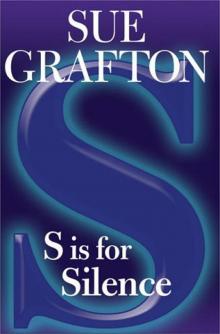 S Is for Silence
S Is for Silence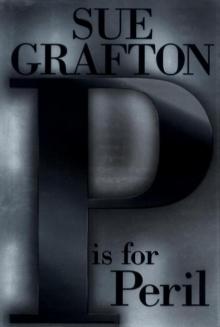 P Is for Peril
P Is for Peril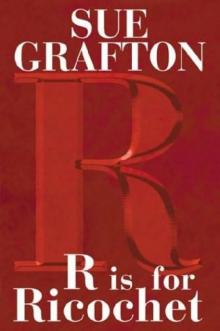 R Is for Ricochet
R Is for Ricochet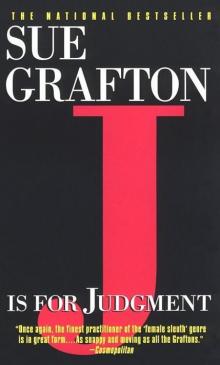 J Is for Judgment
J Is for Judgment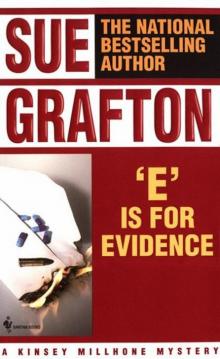 E Is for Evidence
E Is for Evidence T Is for Trespass
T Is for Trespass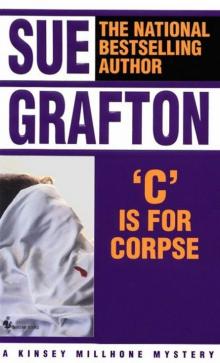 C Is for Corpse
C Is for Corpse U Is for Undertow
U Is for Undertow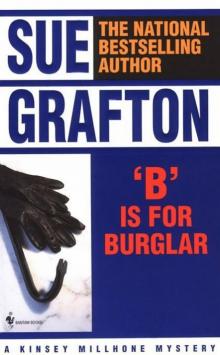 B Is for Burglar
B Is for Burglar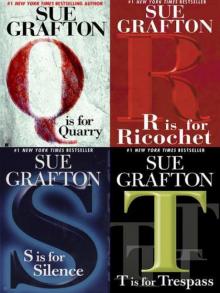 Four Sue Grafton Novels
Four Sue Grafton Novels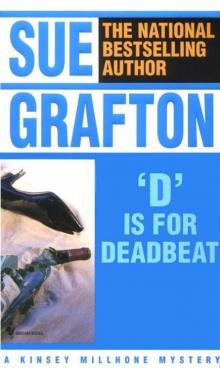 D Is for Deadbeat
D Is for Deadbeat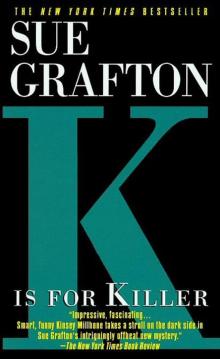 K Is for Killer
K Is for Killer I Is for Innocent
I Is for Innocent A Is for Alibi
A Is for Alibi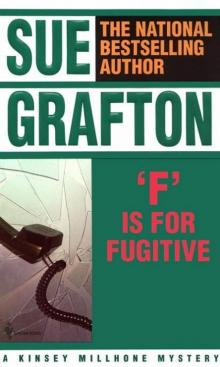 F Is for Fugitive
F Is for Fugitive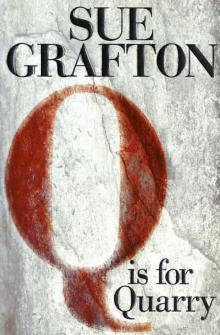 Q Is for Quarry
Q Is for Quarry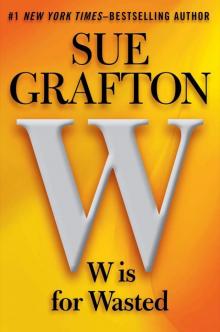 W Is for Wasted
W Is for Wasted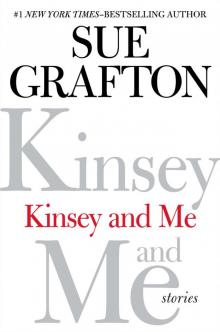 Kinsey and Me: Stories
Kinsey and Me: Stories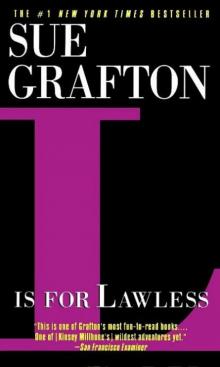 L Is for Lawless
L Is for Lawless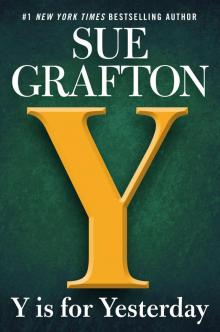 Y Is for Yesterday
Y Is for Yesterday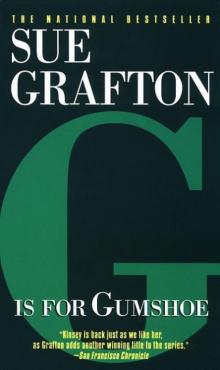 G Is for Gumshoe
G Is for Gumshoe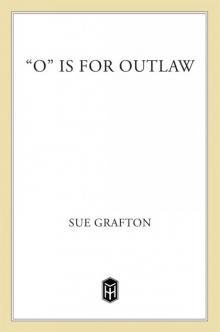 O Is for Outlaw
O Is for Outlaw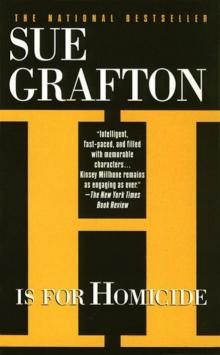 H Is for Homicide
H Is for Homicide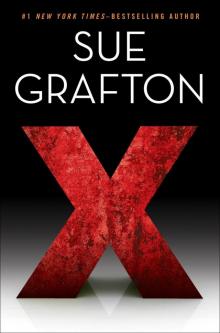 X
X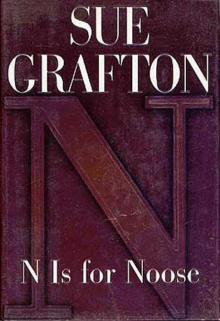 N Is for Noose
N Is for Noose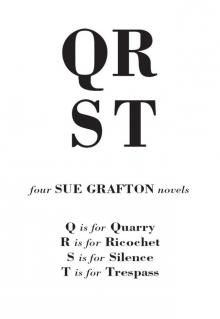 Three Complete Novels: A Is for Alibi / B Is for Burglar / C Is for Corpse
Three Complete Novels: A Is for Alibi / B Is for Burglar / C Is for Corpse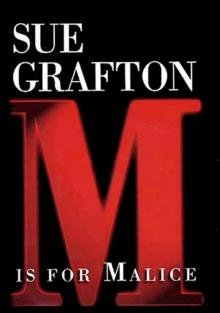 M Is for Malice
M Is for Malice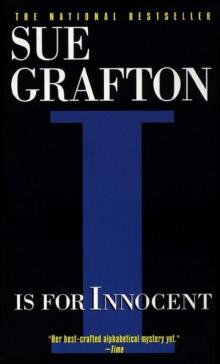 I is for INNOCENT
I is for INNOCENT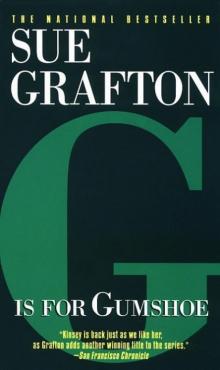 G is for GUMSHOE
G is for GUMSHOE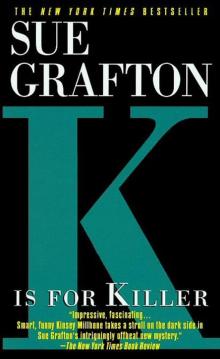 K is for KILLER
K is for KILLER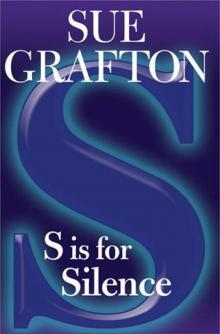 S is for SILENCE
S is for SILENCE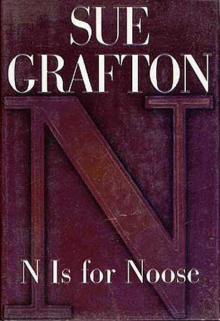 N is for NOOSE
N is for NOOSE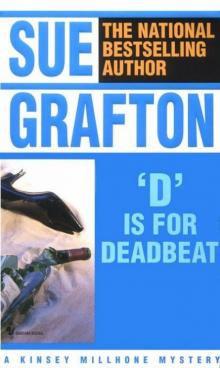 D is for DEADBEAT
D is for DEADBEAT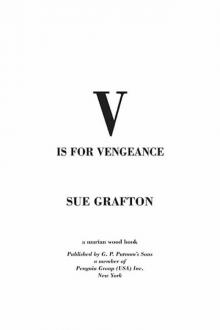 V is for Vengeance
V is for Vengeance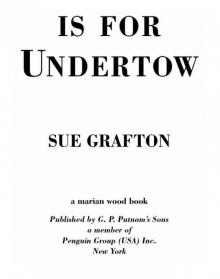 U is for Undertow
U is for Undertow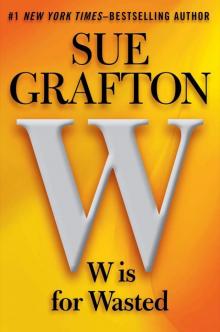 W Is for Wasted km-23
W Is for Wasted km-23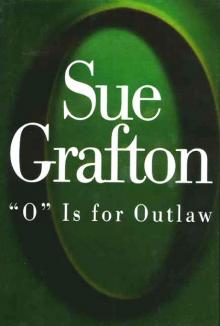 O is for OUTLAW
O is for OUTLAW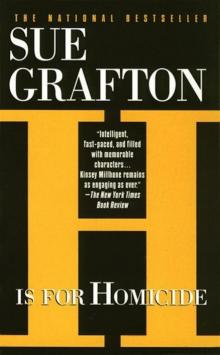 H is for HOMICIDE
H is for HOMICIDE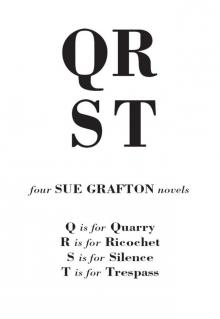 Sue Grafton Novel Collection
Sue Grafton Novel Collection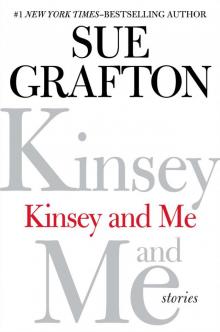 Kinsey and Me
Kinsey and Me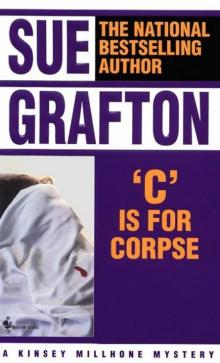 C is for CORPSE
C is for CORPSE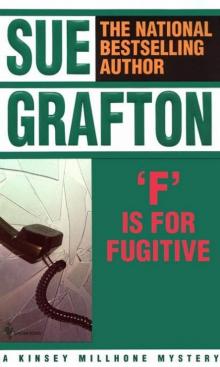 F is for FUGITIVE
F is for FUGITIVE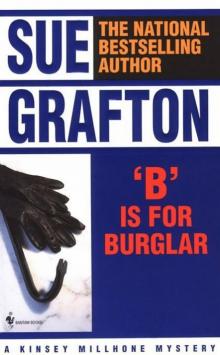 B is for BURGLAR
B is for BURGLAR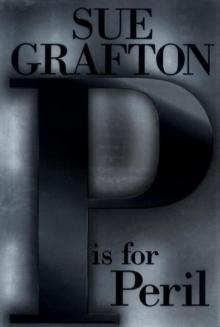 P is for PERIL
P is for PERIL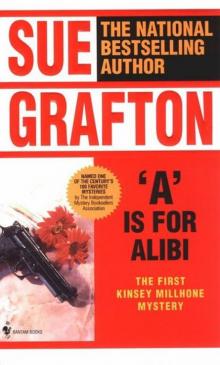 A is for ALIBI
A is for ALIBI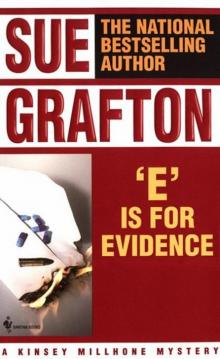 E is for EVIDENCE
E is for EVIDENCE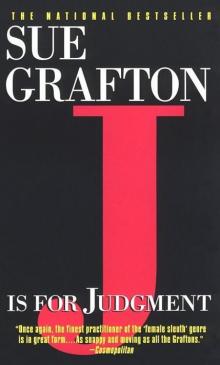 J is for JUDGMENT
J is for JUDGMENT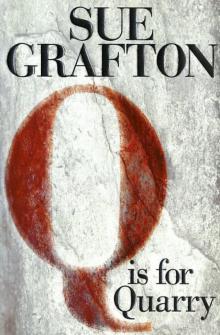 Q is for QUARRY
Q is for QUARRY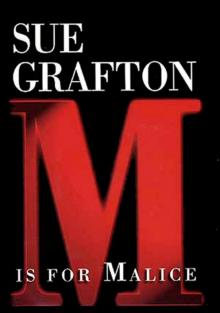 M is for MALICE
M is for MALICE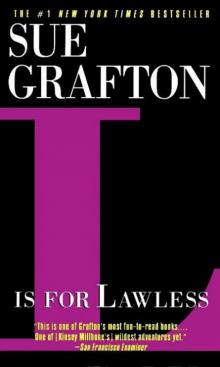 L is for LAWLESS
L is for LAWLESS